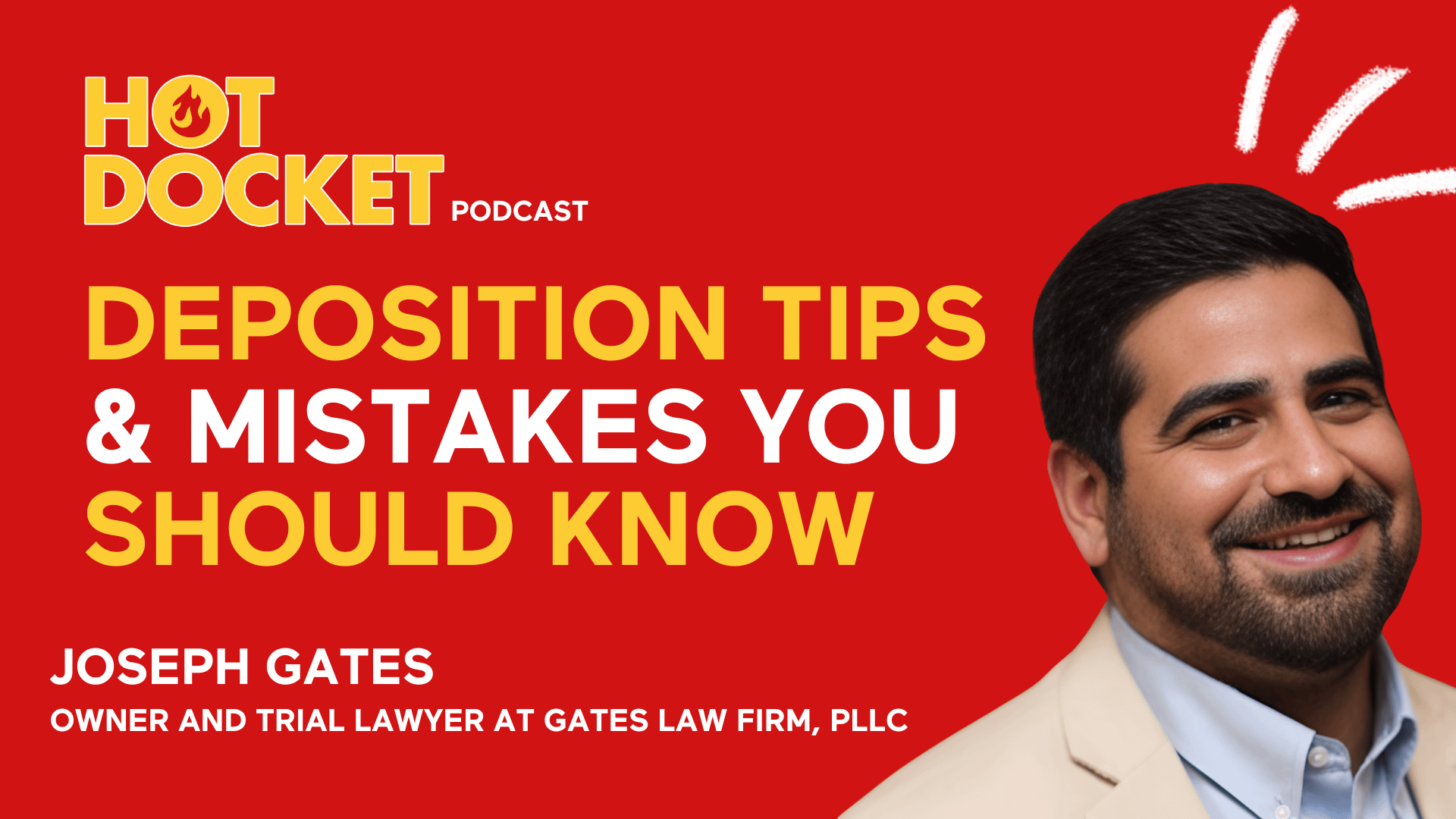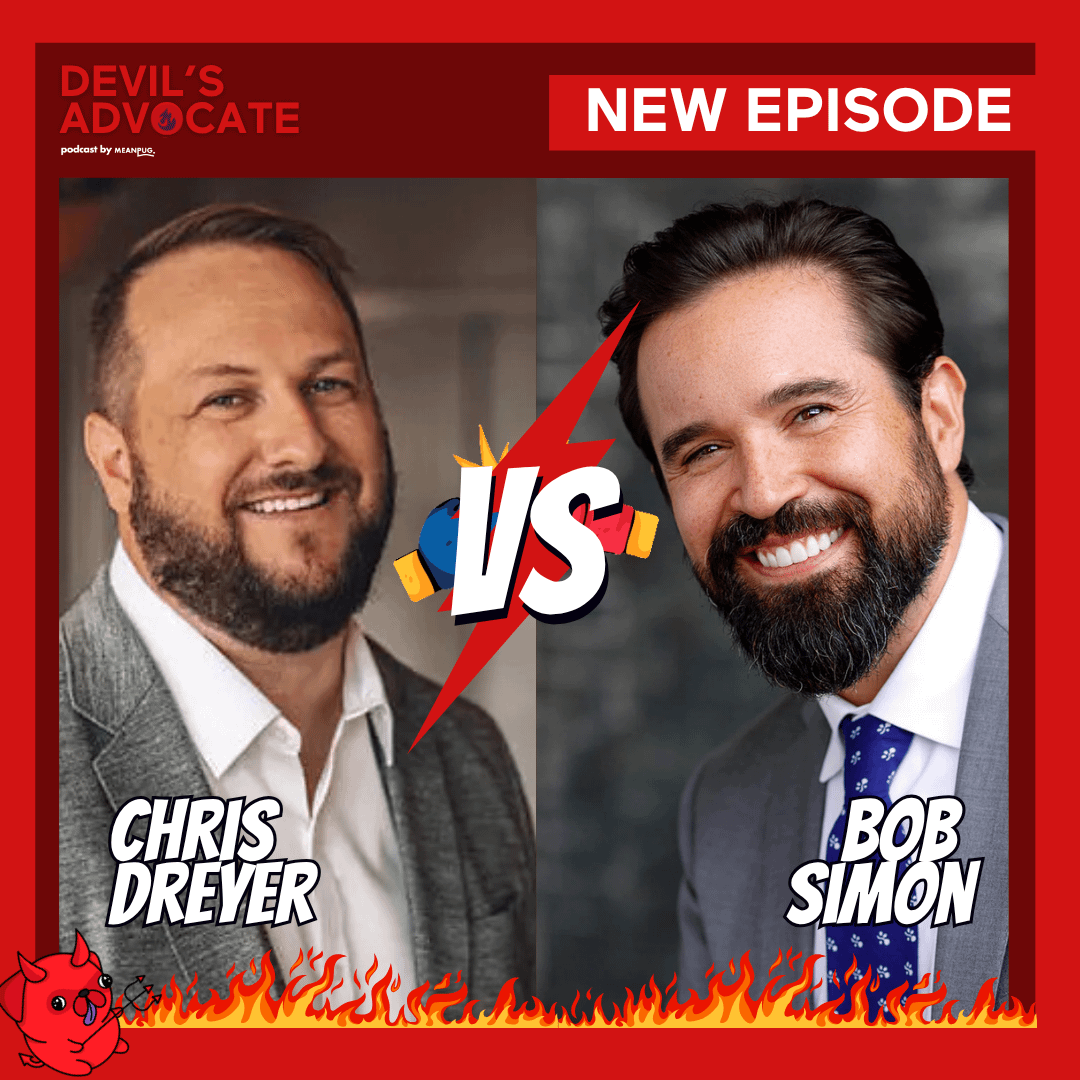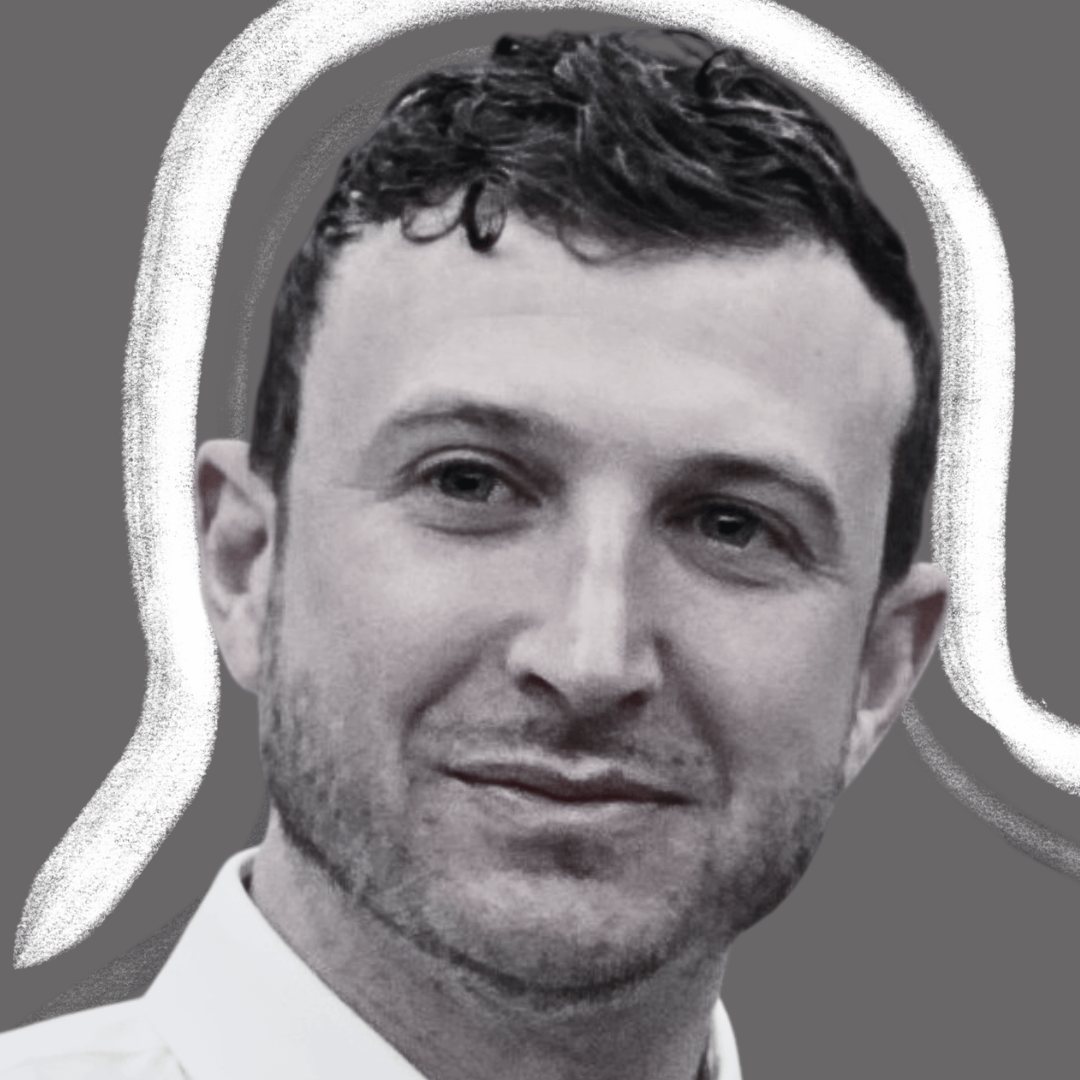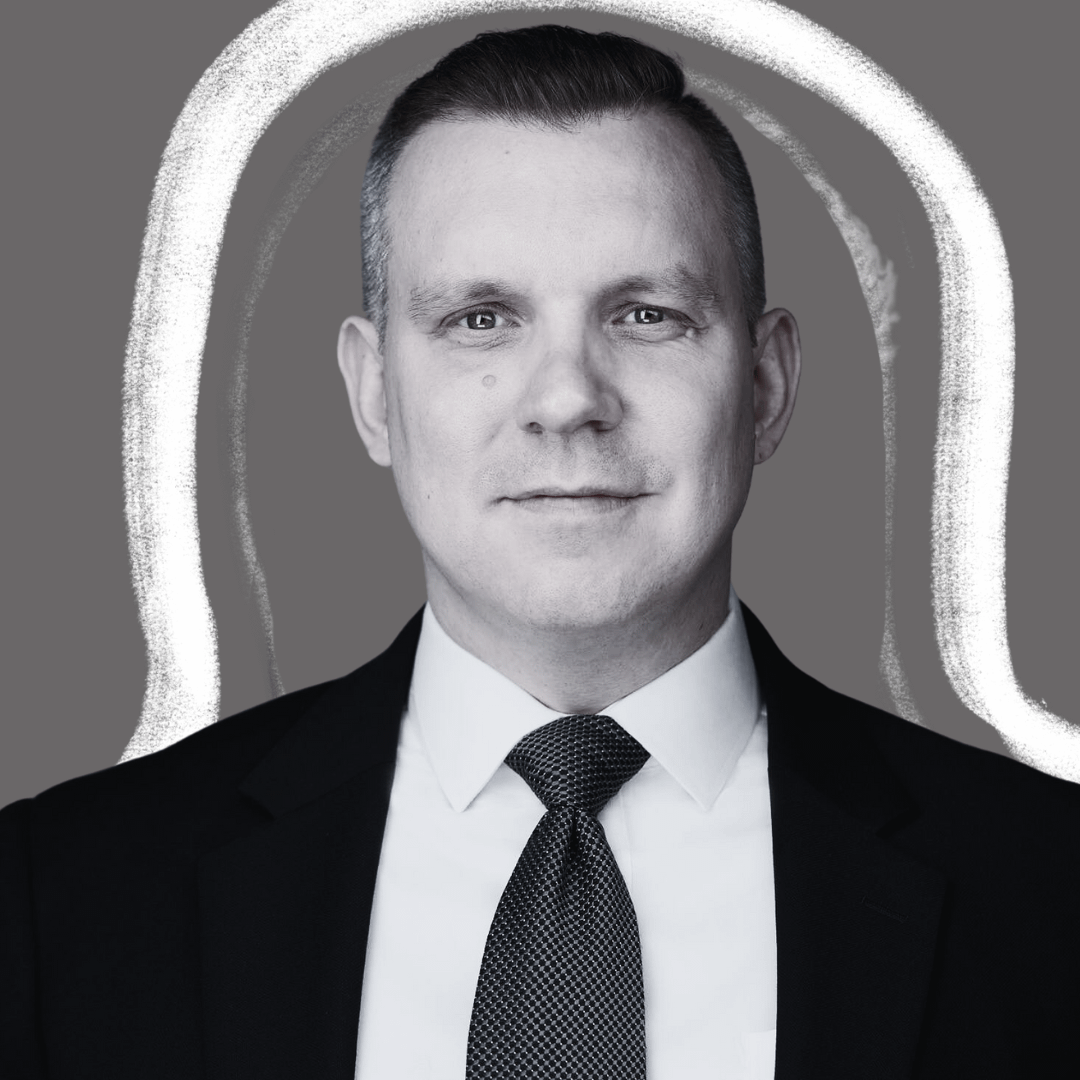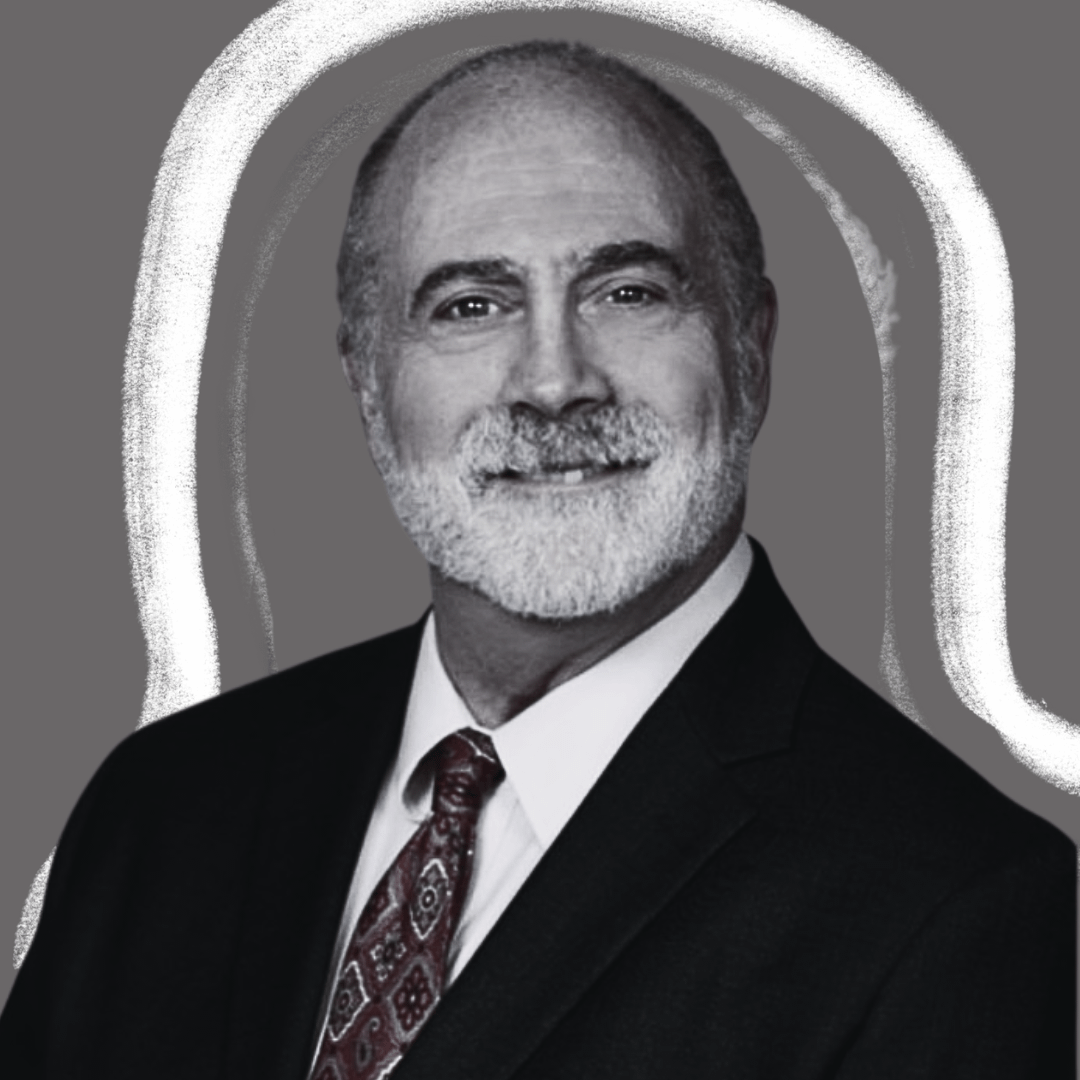[00:00:00] Joseph Gates:
Collaborating with other people and just learning techniques, uh, is the best
way to improve, uh, but overall, you know, don’t be afraid to try
something. If it doesn’t work great, you’re not going to commit
malpractice by trying something new.
[00:00:15] Bobby Steinbach:
Welcome to Hot Docket, the show where we talk about winning marketing strategies
that have built the most successful All.
[00:00:21] Andrew Nasrinpay:
Join us every two weeks for the latest trends and tactics to grow your law firm.
[00:00:27] Bobby Steinbach:
Hey everybody, and welcome to the Hot Docket podcast. Today, we’re going
to be talking about The art of deposition. It’s going to be interesting
for me because I know zero about deposition. Um, I don’t know.
What’s your experience with, with depo?
[00:00:40] Andrew Nasrinpay:
Depot. I like the way you said it, but, uh, I think any time we’re
speaking with a lawyer about trial or litigation or depositions, we gain the
most experience from it because we don’t have that much. And we’re
typically talking about marketing or technology or how to improve intake and all
that sort of stuff where our skill set is.
[00:01:03] Andrew Nasrinpay:
So I’m definitely excited to learn today.
[00:01:05] Bobby Steinbach:
Same here. So let’s get this thing started. Um, today we have with us
Joseph Gates of Gates All, a boutique trial lawyer in the Little Rock, Arkansas
market.
[00:01:19] Bobby Steinbach:
Joseph, thanks for joining us.
[00:01:21] Joseph Gates:
Hey, thanks guys. Appreciate it.
[00:01:23] Andrew Nasrinpay:
So can you tell us a little bit about how you decided to become a lawyer and
just a little bit about that journey?
[00:01:30] Joseph Gates:
Yeah. So becoming a lawyer, um, when I was in college, I had a psychology degree
and so I knew that bought me more school. So my junior year, I just decided to,
uh, take the LSAT.
[00:01:45] Joseph Gates:
did not do good the first go around, but tried again and get a pretty good score
to get into the University of Arkansas, which I’m really proud of to be an
alum. My mother would say I was destined to be a trial lawyer at like age of
four because I just always argued the exceptions. And I’m paying for my
raising.
[00:02:04] Joseph Gates:
Cause my oldest daughter, uh, who is eight now does the exact same thing to me.
So I don’t know, I don’t know, maybe she’ll want to do that or
not, but I’m definitely, everything’s a negotiation.
Everything’s an argument. So, um, but I, you know, I, I not good with my
hands. So I just use my mind and, and my, and my voice, I guess, uh, to make a
living.
[00:02:28] Bobby Steinbach:
I’m the exact same way. My, uh, my wife calls it tit for tat. I
don’t think it’s tit for tat. I’m making a point. I’m
making an argument, right? It depends on who you ask, I guess. Right.
[00:02:40] Joseph Gates:
Right. And you know, arguing is good. That’s how this country was founded
on arguments. Doesn’t mean it’s a bad thing if, uh, the voice gets
raised a little bit sometimes to be passionate about your point.
[00:02:51] Bobby Steinbach:
All right. That’s next time I have a, uh, An argument with Gary.
I’ll say arguing is good and that’ll buy me a little space, a little
time.
[00:02:59] Joseph Gates:
Yeah. It’s constitutional. Just say you’re being a good American
citizen.
[00:03:03] Bobby Steinbach:
Yeah, that’s great. All right. I’ll try it out. Um, so is there
anything unique in the Little Rock market that makes either, you know, your job
as litigating or marketing for the cases, uh, unique?
[00:03:16] Joseph Gates:
I wouldn’t necessarily say Little Rock specific. I mean, it is the capital
of Arkansas, but generally speaking, Arkansas is a small state and we all know
each other. Uh, so in some aspects that can be very helpful, but, um, opposing
counsel and I go way back and, um, you know, I may even know them from, uh,
before becoming a lawyer, but, um, sometimes that can be bad if, you know,
things get crossways and, you know, You know, fold me once, shame on you.
[00:03:44] Joseph Gates:
Fold me twice, shame on me. Uh, so it, everyone knows each other and, um.
That’s what makes it unique compared to other states. And on the plaintiff
side, it’s not as, I mean, everyone competes for the case at the
beginning, but whoever gets the case after we all on the plaintiff side, uh, we
all kind of collaborate together, especially if they’re like the Arkansas
trial lawyer association and it’s, uh, can be, you know, iron, iron,
sharpens iron, and we all kind of work together to build up what’s the
best result.
[00:04:16] Joseph Gates:
And I think that is unique for Arkansas compared to other states have. part of
the American Association for Justice and, uh, some other national trial lawyer
groups. And I don’t know if that’s necessarily the case across the
country, where it seems to be that most plaintiff lawyers are more isolated in
their firm, whereas here it’s a lot more collaborative across firms.
[00:04:40] Bobby Steinbach:
And since we’re talking about, you know, the art of depot and that’s
today’s theme, can you tell us a little bit about, you know, if
you’re a trial lawyer and you want to get better at the depot side of
things, you know, what, what should these folks be doing to improve that skill
set?
[00:04:54] Joseph Gates:
Sure. So, uh, for, for me, um, uh, when I started out as a, as a, Baby trial
lawyer.
[00:05:04] Joseph Gates:
I went to an advertising firm that I was handed 125 cases cases at a given time
and said, good luck. So a lot of the, how I learned was through failure and I
would highly recommend just fail fails fine. Failing’s great. Um, things
don’t work. That’s learned from it. Read the transcripts after
they’re done.
[00:05:23] Joseph Gates:
I think that’s something that I struggle with, um, uh, myself, but I would
highly encourage everyone to read the transcripts after, uh, not just preparing
for that. Particular case, but trying to see, uh, how it plays out. Um, a lot of
times I’ve, we video depositions and so watch the videos as well. Um, so
there’s some self study, uh, broader, uh, uh, I mentioned that I was part
of the American association for justice and they have a deposition college.
[00:05:53] Joseph Gates:
And so I highly recommend people attend those, uh, there are books, uh, Paul
Sculptor and Philip Miller wrote an excellent book called, uh, advanced depots.
I’ve got, I’m actually giving a talk tomorrow on depositions. And so
I’ve got my copy here and it’s full of tabs. And I refer to this
yearly, uh, not yearly, monthly.
[00:06:13] Joseph Gates:
Uh, and so, um, I mean, of course, other collaborating with other people and
just learning techniques, uh, is the best way to improve, uh, but overall, you
know, don’t be afraid to try something. If it doesn’t work great.
Uh, it’s not gonna, you’re not going to commit malpractice by trying
something new.
[00:06:30] Andrew Nasrinpay:
Can you tell us some of the, uh, common mistakes people often make
[00:06:37] Joseph Gates:
from, from what I can, a common mistake is going in, you need to have a plan
before you walk into the door.
[00:06:44] Joseph Gates:
So if you don’t have a plan, that’s a problem. And what I typically
do is create an outline, uh, of various topics that I want to get accomplished,
uh, in the deposition. Um, So spending time beforehand, it’s not just
you’re waking up and you’re going to go in there and ask a bunch of
questions, uh, have a plan beforehand.
[00:07:04] Joseph Gates:
Um, the other thing is recognizing that at least on the civil plaintiff side,
um, or civil litigation generally, uh, trials are few and far between, uh, these
days. Uh, so the deposition is the trial treated just like you’re in front
of a judge and a jury, uh, take it seriously, um, work towards, we want to
prepare for trial.
[00:07:29] Joseph Gates:
So treat the deposition as if, It’s a bunch of deposition clips like video
clips that will be used later. So having that intentionality, I think is not
everyone takes it that seriously.
[00:07:42] Andrew Nasrinpay:
Makes sense. So as a trial lawyer, I feel like referrals are a hugely important
part of your practice. Have there been any strategies you’ve had to get
more referrals or generate those new relationships that you found particularly
effective?
[00:07:58] Joseph Gates:
Uh, I’ve, I’ve joined a lot of the trial lawyer community, uh, uh,
groups, like I said, the Arkansas trial lawyers, uh, American association for
justice, uh, being out in the community. I mean, ultimately success matters. Uh,
so being good at your job is the best way to, uh, to get a referral. But, uh, as
far as, uh, attorney referrals, it’s just getting out in the community,
serving, um, You know, on, on the boards, uh, and other aspects like that, for
me, that’s been my journey is I’m primarily referral based.
[00:08:33] Joseph Gates:
I don’t have like a big marketing campaign or anything like that. Usually
one of my clients, there’s a, uh, like a one degree separation between me
and the, and the client either. I know them somehow through a friend network or,
or a lawyer network.
[00:08:49] Bobby Steinbach:
Yeah. And I think about referral network and building that up a lot of times it
can be an artificial process and obviously organic is best.
[00:08:58] Bobby Steinbach:
Um, But just having those collisions and, and not, not car collisions. I mean
like collisions between people, uh, I think just raises the probability that you
get those referrals.
[00:09:10] Andrew Nasrinpay:
Definitely.
[00:09:12] Bobby Steinbach:
So like on the topic of marketing that works versus maybe strategies that
don’t, uh, I’d love to hear from you, you know, what marketing you
have tried.
[00:09:20] Bobby Steinbach:
I know it’s not a big source of business for you, um, which is totally
makes sense given your market, but I’d still love to hear, you know, what
was successful and what maybe would you recommend folks don’t spend their
time and money on.
[00:09:34] Joseph Gates:
Well, uh, I am not an expert in this area. So, uh, lean on, on you guys, uh, for
help on that.
[00:09:41] Joseph Gates:
So for, but for me, uh, I pay someone to help with my social media. I think that
I’ve been told that it, that it helps, you know, just for the branding
side, um, I think being authentic, uh, really helps. Um, I’ve embraced
that, you know, I use the cases that I work on are usually difficult and someone
else’s problem.
[00:10:01] Joseph Gates:
And, um, I bring a skill set of, uh, hard work and I know that sounds cliche,
but, uh, willing to dig in and, and, you know, work a case for a long time. Um,
most of my cases take multiple years, uh, before they’re done and, um,
been able to figure out a cashflow to sustain that in between, uh, cases. Uh,
but as far as.
[00:10:29] Joseph Gates:
Dollar spins and stuff like that. Honestly, I, I’m the wrong guy for that.
Um, I just, I think people find me genuine and that’s just been that,
that’s the way I’ve been getting business. You know, I’ve been
blessed by that.
[00:10:44] Bobby Steinbach:
Yeah. I, I’d love to circle back to depot because, you know, you brought
up something interesting in that, which is, Your cases take a long time to, you
know, your cash flow isn’t as predictable.
[00:10:54] Bobby Steinbach:
Right. And I think a large part of that is just the type of cases that
you’re working. Um, I’d love to hear how depot for, let’s say,
catastrophic, uh, truck accident case might differ from, you know, I don’t
know, run of the mill car accident, like what is the difference in process?
[00:11:10] Joseph Gates:
Well, I’ll give a concrete example.
[00:11:12] Joseph Gates:
Uh, so, last month, I had a decision to make that the, a defendant on a, on a
car crash lived out of state and I knew my margins were kind of going to be kind
of small on that particular, uh, case. So, I just decided in, in lieu of, uh,
You know, paying for a hotel and an airplane that I just did the deposition
through zoom.
[00:11:33] Joseph Gates:
Um upside to that was you know I got to sleep in my own bed the night before and
I got to sleep in my own bed the the day of The the deposition but the other
thing a practical thing is I asked my court reporter who? Did the zoom to just
hit the record button? So now i’ve got a i’ve got a video and a
transcript essentially for the price of uh, the court reporter Um I
wouldn’t do that for every case.
[00:12:00] Joseph Gates:
Um, if it is a contested catastrophic case, you know, I take it very seriously
and I want to be in the room because even doing it through zoom, you can get 90
percent there. Right. But I mean, there is something about being in the room and
feeling the energy and feeling, um, How body language and how all that’s
going, that it’s hard to do through zoom, through zoom or through video
conferencing, uh, like right now, like we’re in separate places, I think
this is going well, but if we were in the room, you know, you could, we could
bounce off each other just a little bit better.
[00:12:35] Joseph Gates:
So for, uh, uh, more catastrophic case, I definitely want to be in the room.
[00:12:40] Bobby Steinbach:
Yeah, and I, I think that actually ties kind of interestingly back to a
conversation we had earlier in the podcast, um, with a guy who, Eric, Eric Baum,
who is building, um, virtual like remote depot software, right? So just enabling
that process and making it a little bit easier and cheaper for everybody.
[00:13:00] Bobby Steinbach:
And I think the most common kind of pushback he said he got to is people want to
feel like they’re in the room. They want to feel that presence. And so I
think you’d like what you’re saying is pretty much right on the
money for what he was saying his biggest self problem is to solve.
[00:13:15] Joseph Gates:
Well, who knows what the, the, those Apple glasses or whatever that we can just
put those on for easy and it will, it’ll all work out.
[00:13:22] Joseph Gates:
Uh, but no, I think there’s something about the human connection,
especially in these type of cases, um, uh, the, the human element is, uh, what
drives the case. And so being in the room, being, having that interaction really
matters.
[00:13:35] Andrew Nasrinpay:
That makes sense. Um, are there any cases you’d want to give as an example
that kind of make you happy to be a trial lawyer?
[00:13:43] Joseph Gates:
Yes. Uh, so. I’ll give one example. It was a, I’ve been a, so I do
products liability cases. And, uh, the thing I love about a product’s
liability case, that’s where a product fails and cause catastrophic
injury. Um, those are mechanisms for change. Um, the classic example, of course,
I was too young to work on this, but, uh, I’m sure y’all are
familiar with the Fort Pinto case, um, where.
[00:14:12] Joseph Gates:
People who were, who were rear ended in a Ford Pinto where the gas can was
situated, it would explode and cause fire and, you know, death, mayhem, uh, just
gnarly stuff. There was a literal memo by the Ford executives that said it would
be cheaper for us to pay out the individual claims than it would to recall.
[00:14:32] Joseph Gates:
Uh, the, the vehicles, so classic profits over people, right? They made a, the,
uh, the Ford man, the Ford company made a conscious decision to not take care of
their customers because it would cost a little bit more money. And, and the
money we were talking about in between the two is not like a grave amount, but,
you know, with a recall, I guess there could be some, um, negative press with
that, you know, But it would have been the right thing to do because it would
save lives.
[00:15:00] Joseph Gates:
So that memo eventually was found and Ford was exposed for that horrible
corporate decision of valuing, um, the bottom line over their customers. And
that led to a change where that, that model, and for really most vehicles
don’t really have that issue anymore. So personally, I’ve been a
part of a couple of cases like that.
[00:15:22] Joseph Gates:
I hesitate to give too much detail because of, you know, confidentiality
agreements, which is another bane of my existence. But a broad stroke. I was a
part of, um, it wasn’t quite like the Takata airbag cases, but it was
adjacent to that where a, uh, motor, uh, motor vehicle company changed that
line. So what caused the mechanism that killed my client?
[00:15:51] Joseph Gates:
was no longer part of the manufacturing process. And so I think about, I think
about that case and I think about that family, how they had to endure the loss
of their son who just had a baby girl. So that was, I think I just had my oldest
daughter at the same time. So I felt a kinship to, to, uh, the deceased, uh, on
that, that He didn’t die in vain because it led to, uh, the vehicles being
safer moving forward.
[00:16:17] Joseph Gates:
Um, another example was that elevator case that I was a part of that, um, home
residential elevators left too much space between the chassis and then the, the
doors that would close. And so. Children could get stuck in there. And when that
would happen in the elevator moved up, uh, when it came back down, it actually
suffocated this poor boy, um, and with his mom outside having to hear it, hear
her son die.
[00:16:46] Joseph Gates:
Um, that was a gruesome case, but through that, the CP, uh, the consumer
protection safety commission, which is part of the United States government
finally issued a mandatory recall for all home elevators because of that
problem. So now they will be. Created differently. So that amount of space
won’t, it won’t be as big.
[00:17:08] Joseph Gates:
So children won’t get stuck and, uh, have to endure pretty, um, families
won’t have to endure, uh, the loss of their children. So those are just
two examples off the top of my head, where I’ve just, I wake up, I’m
like, Hey, the world’s a little bit better place because I did a little
bit of legal work on it.
[00:17:25] Bobby Steinbach:
Are there any. of the active product liability cases that you can think of right
now, whether it’s like pressure cooker or any of these other ones that you
think this needs to happen kind of tomorrow, this is a huge issue and you want
it to fall into this camp of change.
[00:17:40] Andrew Nasrinpay:
Removing the mass product liability ones like the mass torts for pharmaceutical.
[00:17:45] Andrew Nasrinpay:
Yeah.
[00:17:47] Joseph Gates:
Yeah. So I can’t think of anything that’s always, I can’t
think of anything off the top of my head on that. Um, right now I find myself
dealing with some, um, child sex abuse cases. And so now I’m like, yeah,
we all need to be more aware, uh, uh, of. Predatory behavior and grooming
process. Um, but I can’t think of a pro a current products case I’m
working on.
[00:18:15] Joseph Gates:
That’s like, Hey, we need to, to recall that, but, um, they exist. And
what’s, what’s, what’s, uh, unique about my profession that
I’m proud to be a part of is it’s usually a trial lawyer figures out
first and then the press figures out what their trial lawyers figuring out, and
then the press puts media pressure and then eventually government, uh, uh,
Government acts, but it starts with the trial lawyer.
[00:18:41] Joseph Gates:
It’s rarely that a journalist figures it out first. It’s usually a
case, uh, that a trial lawyer’s working up and then they work it up and
then the press gets a hold of it, and then if there’s enough media
pressure, then it actually leads to change at a congressional level. Um, I can
think specifically, uh, the, the GM Ignition case, um, where that happened.
[00:19:01] Bobby Steinbach:
Yeah, that’s a virtuous cycle. Um. Okay. So just to lighten up at the end
here a little bit, we’re going to finish out Joseph with a little game. We
always have one at the tail end. Today’s game is, uh, hopefully not
terrible. It’s always a crapshoot, but hopefully it’s a good game.
We’ve got Fact or Fiction.
[00:19:30] Bobby Steinbach:
So I’m going to read off five statements and I want you to tell me which
you think are fact. And which are fiction, uh, we’ll go back and forth.
I’ll do the first one. Then Andrew do number two. Um, okay. Number one,
France is responsible for giving us French fries.
[00:19:46] Joseph Gates:
I would say false. That’s two on the nose.
[00:19:49] Bobby Steinbach:
Yep. Nailed it. Belgium.
[00:19:51] Andrew Nasrinpay:
The human body has three lungs.
[00:19:54] Joseph Gates:
False.
[00:19:56] Bobby Steinbach:
Yeah. That was almost like so stupid that I thought it might trick. Yeah.
That’s
[00:20:00] Joseph Gates:
why I hesitate. It’s like, well, I’ve seen, uh, there’s two,
but is there something I don’t know?
[00:20:05] Bobby Steinbach:
Right. Am I forgetting the third lung? Um, okay. Number three in Switzerland,
it’s illegal to flush the toilet after 10 PM in an apartment building.
[00:20:15] Joseph Gates:
Oh man. Uh, never been to Switzerland. That is such a unique thing. I am going
to guess true. That’s true.
[00:20:22] Bobby Steinbach:
That one’s actually false. It’s a noise regulation, but
there’s no specific anti flush. Okay.
[00:20:30] Joseph Gates:
So you
[00:20:30] Bobby Steinbach:
can flush.
[00:20:30] Joseph Gates:
Not yet. Not yet. We can lobby.
[00:20:35] Andrew Nasrinpay:
A group of hippopotami is called a bloat.
[00:20:41] Joseph Gates:
Uh, I want this to be true because that’s funny.
[00:20:44] Bobby Steinbach:
You got it. And wrap it up here. It’s illegal to mispronounce Arkansas.
[00:20:50] Joseph Gates:
Uh, yes, that’s actually when our founders fought the Revolutionary War.
That was part of the problem. Yes.
[00:21:00] Bobby Steinbach:
And that is it. Thanks for joining us, Joseph. On today’s episode. Great
chatting.
[00:21:05] Joseph Gates:
Thanks.
[00:21:12] Bobby Steinbach:
All right. Depot. Something I knew zero about going in.
[00:21:15] Andrew Nasrinpay:
Uh, it still bothers me that you, you pronounce it like that. Arkansas. It does.
No. Oh, depo. You say depo. Like,
[00:21:24] Bobby Steinbach:
I thought you were saying I should be saying Arkansas,
[00:21:26] Andrew Nasrinpay:
Arkansas, if you want to do it a really bad.
[00:21:30] Bobby Steinbach:
I think it’s Arkansas. All right. Well, I might be going to jail if
that’s illegal.
[00:21:36] Bobby Steinbach:
I knew our forefathers fought for it. Four fathers fought for it. Hard to say.
Anyways, good seeing everybody. And we’ll catch you on the next hot docket
podcast. We hope you’ve enjoyed this episode of hot docket. We’re
your hosts, Bobby and Andrew, founders of Mean Pug, the marketing agency for
ambitious All.
[00:21:52] Andrew Nasrinpay:
Have questions about marketing or anything we covered today? Email us at bark at
mean pug. com.
